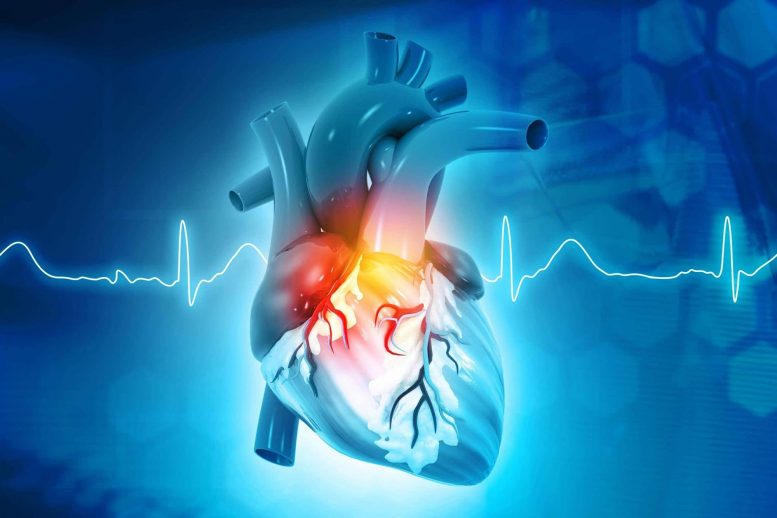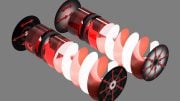
A team from the Cleveland Clinic has identified a new contributor to cardiovascular disease: 4PY, a byproduct of excess niacin (vitamin B-3). Their research shows that high levels of 4PY are linked to an increased risk of heart attack, stroke, and vascular inflammation, which can lead to atherosclerosis.
Excess niacin fuels inflammation, cardiovascular disease through newly discovered pathway.
Cleveland Clinic researchers have identified a new pathway that contributes to cardiovascular disease associated with high levels of niacin, a common B vitamin previously recommended to lower cholesterol.
The team, led by Stanley Hazen, M.D., Ph.D., discovered a link between 4PY, a breakdown product from excess niacin, and heart disease. Higher circulating levels of 4PY were strongly associated with development of heart attack, stroke and other adverse cardiac events in large-scale clinical studies. The researchers also showed in preclinical studies that 4PY directly triggers vascular inflammation which damages blood vessels and can lead to atherosclerosis over time.
Implications for Diagnostic and Therapeutic Approaches
The study, published on February 19 in Nature Medicine, also details genetic links between 4PY and vascular inflammation. The findings provide a foundation for potential new interventions and therapeutics to reduce or prevent that inflammation.
“What’s exciting about these results is that this pathway appears to be a previously unrecognized yet significant contributor to the development of cardiovascular disease,” said Dr. Hazen, Chair of Cardiovascular and Metabolic Sciences at Cleveland Clinic’s Lerner Research Institute and Co-Section Head of Preventive Cardiology in the Heart, Vascular & Thoracic Institute. “What’s more, we can measure it, meaning there is potential for diagnostic testing. These insights set the stage for developing new approaches to counteract the effects of this pathway.”
Reevaluating Niacin Fortification and Use
Niacin (vitamin B-3) is very common in a Western diet. “For decades, the United States and more than 50 nations have mandated niacin fortification in staple foods such as flour, cereals and oats to prevent disease related to nutritional deficiency,” said Dr. Hazen. Yet one in four subjects in the researchers’ patient cohorts appear to be getting too much, and had high levels of 4PY, which appears to contribute to cardiovascular disease development.
Dr. Hazen compares our intake of niacin as multiple taps pouring water into a bucket. Once that bucket is filled, it begins to spill over. The human body then needs to process that spill-over and produce other metabolites, including 4PY.
“The main takeaway is not that we should cut out our entire intake of niacin – that’s not a realistic approach,” said Dr. Hazen. “Given these findings, a discussion over whether a continued mandate of flour and cereal fortification with niacin in the U.S. could be warranted.”

Cleveland Clinic researchers, led by Dr. Stanley Hazen, have identified a new pathway that contributes to cardiovascular disease associated with high levels of niacin. Credit: Cleveland Clinic
Dr. Hazen notes broader use of over-the-counter supplements made with different forms of niacin has also become popular because of presumed anti-aging purposes. He adds that patients should consult with their doctors before taking over-the-counter supplements and focus on a diet rich in fruit and vegetables while avoiding excess carbohydrates.
The new findings also might help explain why niacin is no longer a go-to treatment for lowering cholesterol. Niacin was one of the first treatments prescribed to lower LDL or “bad” cholesterol. However, eventually niacin showed to be less effective than other cholesterol-lowering drugs and was associated with other negative effects and higher mortality rates in previous research.
“Niacin’s effects have always been somewhat of a paradox,” Dr. Hazen said. “Despite niacin lowering of cholesterol, the clinical benefits have always been less than anticipated based on the degree of LDL reduction. This led to the idea that excess niacin caused unclear adverse effects that partially counteracted the benefits of LDL lowering. We believe our findings help explain this paradox. This illustrates why investigating residual cardiovascular risk is so critical; we learn so much more than what we set out to find.”
The study authors note that long-term investigations are needed to assess the effect of chronic elevation of 4PY levels on atherosclerosis and other phenotypes.
The research is part of Dr. Hazen’s ongoing investigation into factors that contribute to residual cardiovascular risk. His team follows patients over time and collects blood samples to find chemical signatures that can predict the development of heart disease. He has made pioneering discoveries in atherosclerosis and inflammatory disease research, including the seminal discovery linking gut microbial pathways to cardiovascular disease and metabolic diseases.
Reference: “A terminal metabolite of niacin promotes vascular inflammation and contributes to cardiovascular disease risk” by Marc Ferrell, Zeneng Wang, James T. Anderson, Xinmin S. Li, Marco Witkowski, Joseph A. DiDonato, James R. Hilser, Jaana A. Hartiala, Arash Haghikia, Tomas Cajka, Oliver Fiehn, Naseer Sangwan, Ilja Demuth, Maximilian König, Elisabeth Steinhagen-Thiessen, Ulf Landmesser, W. H. Wilson Tang, Hooman Allayee and Stanley L. Hazen, 19 February 2024, Nature Medicine.
DOI: 10.1038/s41591-023-02793-8
Dr. Hazen also directs Cleveland Clinic’s Center for Microbiome and Human Health and holds the Jan Bleeksma Chair in Vascular Cell Biology and Atherosclerosis.
Marc Ferrell, a former M.D., Ph.D. student in Dr. Hazen’s laboratory and student in Case Western Reserve University’s Medical Scientist Training Program, is first author of the manuscript. Research reported in this publication was supported in part by the National Institutes of Health under award numbers R01HL103866, P01HL147823, R01HL133169, R01HL148110, R01HL168493, and U54HL170326.









I’ve been taking a CVS Super B Complex supplement for years and the Niacin (as Niacinamide) is listed as 25 mg and 156% of Daily value. I have a typical Mediterranean diet. Have I been getting too much Niacin?
This is interesting but a little alarmist. That’s fair but I think it could use perspective.
Heart disease was linked to high levels of circulating 4PY, a metabolite of niacin. The cause of the high levels was assumed to be high doses of niacin, but could also be kidney disease reducing elimination of the metabolites.
Overdoses of any vitamin are bad. One in four people getting too much niacin is unlikely. The genetic link mentioned in the article could mean some people need less niacin and others need more. I’d look into that but the study is paywalled.
Those with a high risk of skin cancer are often recommended to take high does of Niacinamide. I take about 1500 mg daily. Perhaps I should reconsider, or is Niacinamide different?
Possibly. Niacinamide is unlikely to be different, as another functional analogue of niacin. Translating studies into practical advice is an occult divination hobby of mine. You could have your 4PY levels tested, as this study did, or probably just a circulatory system test and urinalysis to check your heart and kidney function. Knowledge is power. These studies are the bleeding edge of scientific progress, and anyone following their advice might feel that edge make them bleed.
Niacinamide at 1500mg is believed to be within the recommended daily allowance. This study suggests that with diet, especially with vitamin fortified foods, you might get too much niacin for your heart health. You could always reduce your supplementary dose to reduce heart disease risk, regardless of your Fitzpatrick score. Anyone reasonable will defer to your doctors, but I’ll also say to be skeptical of their advice, as well as of this study, and everyone else’s, including mine. Niacin is an important vitamin, and I’ve seen evidence it improves heart health and reduces skin cancer in reasonable doses. Always reconsider, everything, often. Good luck Dirk, get any irregular moles checked.